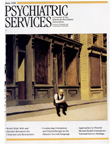Housing accommodation preferences of people with psychiatric disabilities
Abstract
OBJECTIVE: The study sought to identify the types of housing preferred by people with psychiatric disabilities seeking accommodations through a community mental health service in Sydney, Australia. METHODS: Housing options available in the mental health service's catchment area were identified, and the extent of demands on residents' behavior that was associated with each option was assessed using an established measure. Clients examined descriptions of each housing option and rank- ordered the options based on their preferences. Clients' current levels of functioning and symptoms were also assessed. RESULTS: Clients most preferred environments that ensured living alone in settings of low behavioral demand. Living in one's own home was the most preferred option, followed by living in government-subsidized housing, For-profit boarding houses were preferred over psychiatric group homes, and homelessness, long-term hospitalization, and crisis accommodations were least preferred. Shelter, privacy, food, and safety were highly valued housing attributes. Demographic characteristics, level of functioning, and severity of psychiatric symptoms did not predict accommodation preferences. CONCLUSION: Consumers' resistance to psychiatric group housing with high levels of behavioral demand is unrelated to consumer characteristics and should be considered in planning suitable accommodations for persons with psychiatric disabilities.
Access content
To read the fulltext, please use one of the options below to sign in or purchase access.- Personal login
- Institutional Login
- Sign in via OpenAthens
- Register for access
-
Please login/register if you wish to pair your device and check access availability.
Not a subscriber?
PsychiatryOnline subscription options offer access to the DSM-5 library, books, journals, CME, and patient resources. This all-in-one virtual library provides psychiatrists and mental health professionals with key resources for diagnosis, treatment, research, and professional development.
Need more help? PsychiatryOnline Customer Service may be reached by emailing [email protected] or by calling 800-368-5777 (in the U.S.) or 703-907-7322 (outside the U.S.).



